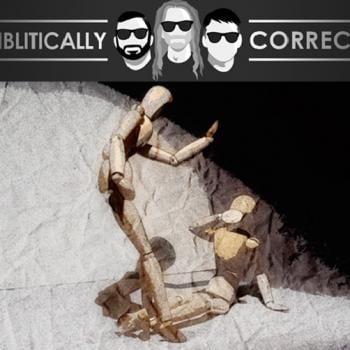
by Natasha Smith (who also wrote Antique Testament)
Who are some memorable villains and what sparked their turning to the dark side? Of course, Darth Vader stands out, fueled by fear and vengeance. Similarly, Thanos believes he has the right to take vengeance into his own hands. Loki’s action results from his search for belonging, identity, and love. Voldemort and Gollum both desire a power too great for them. All these examples shared a similar theme: they covet something and choose to play god for themselves. Their drive for approval, power, and vengeance fueled by fear, destroys them. Ultimately, each character becomes less than human as they trade their dignity for desire.
How super villains tie in with Genesis 3
In most of our favorite stories from galaxies far away, middle earth, or Hogwarts—peace, harmony and goodness once existed. Then something goes terribly wrong.
Similarly, Genesis 2 ends with a world where humans have purpose, prosperity, and peace. All creation agrees with God’s will, and he rests in the joy of his completed work.
One shrewd voice then echoes in the beautiful garden. Its single question proves more devastating than the first hearers ever imagined.
“Did God really say…?”
The serpent questions the one boundary God put in place for humans and actually extends the command to appear utterly unreasonable. “Did God really say you must not eat from any tree in the garden?”
(Fun fact: The ancient cultures surrounding Israel viewed snakes as sources of life and wisdom. Israel recognized snakes as unclean and unsafe animals to be avoided.)
Eve corrects the snake in part, but even she doesn’t completely remember God’s word. “We may eat fruit from the trees in the garden, but God did say, “You must not eat fruit from the tree that is in the middle of the garden, and you must not touch it, or you die.”
(FYI, God never said anything about “touching” the tree. Eve adds that part and also generalizes about the trees in the middle of the garden rather than upholding the boundary around a specific tree—the tree of the knowledge of good and evil.)
“You will not die… For God knows that when you eat from it your eyes will be opened and you will be like God, knowing good and evil.”
Direct contradiction and irony
First, the serpent contradicts God’s statement of certain death that would accompany eating the forbidden fruit in Genesis 2:17. Perhaps the snake didn’t hear God’s decree since God never really speaks to animals other than to bestow the generic blessing to fill the earth. Perhaps the serpent recognizes that no matter how crafty he may be, he will never hold the status given to humans. So he invites the humans to disregard their responsibility as the caretakers of creation by taking direction from a fellow creature rather than the creator.
Second, the serpent draws the humans in by enticing them to become like God. Ironically, humans are already created in the image of God. What more could be done for them to be like God? God placed them on earth with authority, purpose, promise, and blessing.
Through this perverse proposition, Eve and Adam second guess the goodness and provision of God.
They begin to think that God is keeping something good from them. Why shouldn’t they know the parameters of good and evil? Why shouldn’t they know.
Skepticism overruns the heart and prompts disobedience
As questions began swirling around in Eve’s mind, they disturb her peace of mind.
- Is God lying to us about death?
- Is he actually providing enough?
- Who is actually the deceiver?
- Is God wrong?
- Can we really trust God?
- Is God really good?
Rapid activity reveals a lack of thoughtful consideration as Eve grasps to be like God. She sees the fruit as good, delightful, and desirable despite God’s warning. She redefines God’s boundary by her own standard and ignores what he declared “off limits.”
She takes the definition of good and evil into her own hands. Together, Adam and Eve listen to a voice other than their creator for direction on how to live and behave. They become the fool by heeding a voice closer to the dirt and farther from the Father. Likewise, they yield part of their identity as rulers of creation by succumbing to the questions of a cocky animal.
We’d rather be a god
Like Eve and Adam, we often ignore God’s prohibition, protection, and provision. Too often we follow after the examples of our favorite villains and think of ourselves as a god. We search for value, meaning, purpose, love, and acceptance like Loki—and destruction follows. We cannot even be our true selves, but constantly shapeshift simply to find acceptance. We want something that is not ours to have. So lust, pride, and power destroy us like it did Gollum. We are hurt and we want vengeance like Darth Vader or Thanos, and we completely lose control of our identity in the process. We lose our humanity.
Our culture constantly asks us, “Did God really say…?” How will we respond?
Will we trust God’s standard of good and evil no matter what other voices may whisper?













